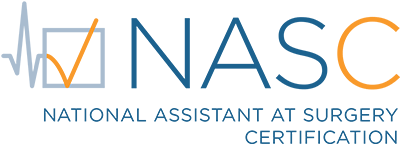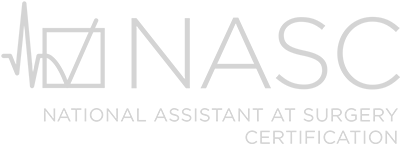Documenting Hours for RNAS-C Recertification
RNAS-Cs can use clinical practice hours toward recertification.
- RNAS-Cs must document at least 300 practice hours during the 3-year recertification cycle. Of the 300 practice hours, at least 250 hours must be for care during the intraoperative phase.
- Documented practice hours may include patient care provided while performing in the RNFA role during the preoperative, intraoperative, or postoperative phases (defined below).
- Attach your log or facility printout to your application.
- Logged practice hours can be used for recertification up to a maximum of 1,400 hours (140 points).
• The Preoperative Phase includes care provided on the day of the procedure from the time the patient enters the surgical facility until the patient enters the operating room. The following may be documented as care performed during the Preoperative Phase:
- conducting history and physical assessments;
- providing patient, family, or caregiver education;
- reviewing patient records in preparation for the surgical procedure;
- participating in preoperative components of the Universal Protocol; and
- communicating the plan of care, special needs of the patient and/or surgeon, and other pertinent information with interdisciplinary and/or perioperative team members.
• The Intraoperative Phase includes care provided from the time the patient enters the operating room until the patient leaves the operating room. While performing in the intraoperative role the RNFA cannot be concurrently serving in any other perioperative role (eg, scrub person).
• The Postoperative Phase includes care provided from the time the patient leaves the operating room until the patient is discharged from Phase 1 post-anesthesia care. The following may be documented as care performed during the Postoperative Phase:
- transporting patient to post-anesthesia care;
- assisting with initial post-anesthesia care monitoring;
- writing postoperative orders;
- writing or dictating progress notes or discharge summaries;
- implementing postoperative interventions (eg, changing dressings, checking and monitoring surgical drains, removing/inserting catheters or intravenous lines, providing nutritional support or electrolyte therapy);
- providing patient, family, or caregiver education;
- collaborating with facility and community resources for post-discharge care; and
- administering medications.
Candidates should document their practice hours using one of the following methods:
- Click here for a printable log that can be completed by hand.
- Click here to download an Excel spreadsheet to document your practice hours.
- Facility printouts may be used to document practice hours. The candidate’s name must be documented as RNFA or first assistant, and the log must include the date of the procedure, type of procedure, duration of procedure delineating pre-, intra-, and postoperative minutes, and name or initials of the surgeon assisted.
Note: The practice hour log you submit for RNAS-C recertification can also be uploaded to your CRNFA certification application.
info@nascertification.org | 866-681-NASC (6272) | Contact
© Copyright 2020 NASC

